- Home
- Lloyd Alexander
The High King (Chronicles of Prydain (Henry Holt and Company)) Page 5
The High King (Chronicles of Prydain (Henry Holt and Company)) Read online
Page 5
Gwydion had come to crouch beside the furious Smoit. “Your larder may be our tomb,” he said grimly. “Not only for ourselves,” he added. “Fflewddur Fflam leads our companions here. Magg’s jaws will close on them as tightly as they are closed on us.”
CHAPTER FIVE
The Watcher
Although Fflewddur Fflam quickly led Eilonwy, King Rhun, and Glew to Avren harbor, their return from the ship was less rapid. First, the King of Mona managed, against all likelihood, to tumble over his horse’s neck when the dapple gray halted to drink at the riverbank. The ducking thoroughly soaked the unlucky King but did not dampen his spirits. However, Rhun’s sword belt had come undone and the blade had sunk in the shallows. Rhun being unable to fish it out again because he had also got himself tangled in the steed’s harness, Fflewddur was obliged to plunge into the river for the weapon. Glew now protested bitterly against riding behind the sopping King.
“Walk, then, little weasel!” cried Fflewddur, shivering and beating his arms against his sides. “By my choice, in the opposite direction!”
Glew only sniffed haughtily and refused to budge.
Eilonwy stamped her foot with impatience. “Will you make haste, all of you! We came to look after Lord Gwydion, and we can hardly look after ourselves.”
The former giant consented to ride behind the Princess on Lluagor, and they set out once more. Llyan, however, had suddenly taken it into her head to be playful. She lunged forward on her huge padded paws and spun joyfully about while the desperate bard clung to her tawny neck. It was all Fflewddur could do to keep Llyan from rolling onto her back with himself astride her.
“She—seldom does this,” shouted the breathless bard, while Llyan, with great leaps, circled the companions. “She’s really been—quite well—behaved! No use—scolding her. Makes no—difference!”
At last Fflewddur was forced, with difficulty, to unsling his harp and pluck out a melody until Llyan grew calm again.
Soon after midday the bard heard the faint, distant notes of Taran’s horn. “They’re worried over us,” Fflewddur said. “I hope we shall soon rejoin them.”
The companions pressed on as quickly as they could, but the distance between the two bands increased rather than dwindled, and at nightfall they wearily halted and slept.
A fresh morning start brought them, according to Fflewddur’s reckoning, less than half a day behind the others. King Rhun, more than ever eager to reach Caer Cadarn, urged all speed from the dapple gray; but the mare’s pace was much slower than Llyan’s and Lluagor’s; Eilonwy and Fflewddur continually had to rein in their mounts.
Midway through the afternoon, King Rhun gave a glad cry. Caer Cadarn lay only a little distance off. They saw Smoit’s crimson banner clearly beyond the trees. The companions were about to hasten onward, but Eilonwy frowned and looked once more at the fluttering standard.
“How odd,” the Princess remarked. “I see King Smoit’s jolly old bear. But Gwydion surely must be there by now, and I don’t see the banner of the House of Don. Queen Teleria taught me it is courtesy for a cantrev noble to fly the Golden Sunburst of Don when one of the Royal House visits him.”
“True enough in ordinary circumstances,” agreed Fflewddur. “But I doubt, at this point, that Gwydion wants anyone to know where he is. He’s told Smoit to put aside the formalities. A most sensible precaution.”
“Yes, of course,” Eilonwy replied. “I shouldn’t have thought of that. How clever of you, Fflewddur.”
The bard beamed happily. “Experience, Princess. Long experience. But never fear. Such wisdom will come to you, in time.”
“Even so,” Eilonwy said, as they rode farther. “It’s curious the gates are closed. Knowing King Smoit, you might suppose they’d be flung wide open and a guard of honor waiting for us, with King Smoit himself at their head.”
Fflewddur waved the girl’s remark aside. “Not a bit of it. Lord Gwydion follows a path of danger, not a round of festivals. I understand how such things are done. I’ve been on a thousand secret missions—ah, well, perhaps one or two,” he added hastily. “I fully expected Caer Cadarn would be buckled, bolted, and shut tight as an oyster.”
“Yes,” Eilonwy said, “I’m sure you know more about such things than I.” She hesitated, straining her eyes to take in the castle, which the companions were now rapidly approaching. “But King Smoit isn’t at war with his neighbors, as far as I’ve heard. Two watchmen on the walls would be more than enough. Does he need a whole party of bowmen?”
“Naturally,” replied Fflewddur, “to protect Lord Gwydion.”
“But if no one is to know Gwydion’s there—” Eilonwy persisted.
“Great Belin!” cried the bard, reining up Llyan. “Now you make my head spin. Are you trying to say Gwydion’s not at Caer Cadarn? If he’s not, we shall soon find out. And if he is, we shall find that out as well.” Fflewddur scratched his spiky yellow head. “But if he’s not, then, why not? What could have happened? And if he is, then there’s nothing to worry about. Yet, if he isn’t … Oh, drat and blast, you’ve turned me queasy. I don’t understand …”
“I don’t understand, either,” Eilonwy answered. “All I know—and I don’t even know it—is that, well, I can’t explain. I—I see the castle all crooked-wise—no, not see. Taste? No … Well, no matter,” she burst out, “I’ve come all over chills and creeps and I don’t like it. You’ve had experience, I don’t doubt. But my ancestors were enchantresses, every one. And so should I have been, if I hadn’t chosen to be a young lady.”
“Enchantments!” the bard muttered uncomfortably. “Stay away from them. Don’t meddle. It’s also been my experience they never turn out well.”
“I say,” put in Rhun, “if the Princess feels there’s something amiss, I’ll be glad to ride ahead and find out. I shall frankly rap on the gates and demand to know.”
“Nonsense,” replied Fflewddur. “I’m quite sure all is well.” A harp string broke and twanged loudly. The bard cleared his throat. “No, I’m not sure at all. Oh, bother it! The girl has put an idea in my head and I can’t shake it out. One way, everything looks all right; the other way, it looks all wrong.
“Just to ease your mind—ah, my mind, that is,” Fflewddur told the Princess, “I shall be the one to find out. As a wandering bard I can go and come as I please. If anything’s wrong, none will suspect me. If not, there’s no harm done. Stay here. I’ll be back directly. We shall laugh over this at King Smoit’s table,” he added, but without great assurance.
The bard dismounted, considering it wiser not to draw attention by riding Llyan. “And you try no mischief,” he warned Glew. “I hate to let you out of my sight, but Llyan will keep an eye on you. Hers are sharper than mine. So are her teeth.”
On foot, the bard made his way to the castle. After a time, Eilonwy saw the gates swing open and Fflewddur disappear within. Then all was silent.
By nightfall the girl had grown seriously alarmed, for there had been no further sign from the bard. The companions had concealed themselves in a thicket, awaiting Fflewddur’s return, but now Eilonwy rose and anxiously faced the castle. “It is all wrong!” she cried, taking an impatient stride forward.
King Rhun drew her back. “Perhaps not,” he said. “Why, he’d have come back immediately to warn us if there was. No doubt Smoit’s giving him supper, or …” Rhun loosened his sword in its sheath. “I’ll go and see.”
“No, you shall not!” Eilonwy cried. “I should have gone in the first place. Oh, I should have known better than to let myself be put off by anyone.”
Rhun, however, insisted. Eilonwy refused. The heated, although whispered, dispute that followed was interrupted by the sudden arrival of the bard himself. Breathless and gasping, he stumbled into the thicket.
“It’s Magg! He has them all!” Fflewddur’s voice was pale as his face in the moonlight. “Caught! Trapped!”
Eilonwy and Rhun listened aghast at what Fflewddur had learned. “The warriors themselves
don’t know who the prisoners are, only that there are four with Smoit locked up for treachery. Treachery indeed! They’ve been made to swallow some kind of tale! The game goes deeper than that. What it is, I couldn’t discover. I think the guards had orders to lay hold of everybody entering the castle. Luckily, those orders didn’t seem to apply to wandering bards. It’s so usual for a bard to drift in and sing for his supper that the warriors never gave it a second thought, though they did keep an eye on me and wouldn’t let me near Smoit’s Great Hall or the larder where they’ve put the prisoners. But I caught a glimpse of Magg. Oh, the sneering, smirking spider! If only I could have run him through then and there!
“The warriors kept me harping until I thought my fingers would drop off,” he hurriedly concluded. “Otherwise, I should have been back long ago. I didn’t dare stop, or they’d have smelled a rat. And there’s a rat to be smelled!” he cried furiously.
“How shall we rescue them?” Eilonwy demanded. “I don’t care why they’re locked up. Ask later. First get them out.”
“We can’t,” Fflewddur answered in despair. “Impossible. Not with only four of us. And that’s four counting Glew, who can’t be counted at all.”
Glew snorted. Usually the little man took no interest in anything not bearing directly on himself; now, his face was agitated. “When I was a giant I could have torn the walls down.”
“Bother when you were a giant,” snapped Fflewddur. “You’re not one now. Our only hope is to go farther into the cantrev, tell one of the cantrev lords what’s happened, and have him rally an attack force.”
“It will take too long,” cried Eilonwy. “Oh, do be quiet and let me think!”
The girl strode again to the clearing, and turned her eyes defiantly toward the castle which flung its own dark defiance against her. Her mind raced, but with no clear plan. With half a sob and half a cry of anger she was about to turn away. A movement against a nearby tree caught her glance. She halted a moment. Not daring to turn her head, from a corner of her eye she grew aware of a strange, humped shadow, motionless now. As if to continue on her path she walked seemingly in the direction of Fflewddur and Rhun, but edged little by little toward the tree.
Suddenly, quick as Llyan, she leaped upon the humped figure. Part of it went rolling in one direction, and the rest of it set up a muffled shrieking. Eilonwy pummeled, kicked, and scratched. Fflewddur and King Rhun were at her side in an instant. The bard seized one end of the flailing shape, King Rhun the other.
Eilonwy drew back and quickly took the bauble from her cloak. As she cupped it in her hand the sphere began to glow. She held it closer to the struggling form. Her jaw dropped. The golden beams shone on a pale, wrinkled face with a long, drooping nose and mournful mouth. Wild wisps of cobweblike hair floated above a pair of eyes that blinked wretchedly and tearfully.
“Gwystyl!” Eilonwy cried. “Gwystyl of the Fair Folk!”
The bard loosened his grasp. Gwystyl sat up, rubbed his skinny arms, then climbed to his feet and pulled his cloak defensively about him.
“How nice to see you again,” he mumbled. “A pleasure, believe me. I’ve thought of you often. Good-bye. Now I really must be on my way.”
“Help us!” Eilonwy pleaded. “Gwystyl, we beg you. Our companions are prisoned in Smoit’s castle.”
Gwystyl clapped his hands to his head. His face puckered miserably. “Please, please,” he moaned, “don’t shout. I’m not well, I’m not up to being shouted at this evening. And would you mind not shining that light in my eyes? No, no, it’s really too much. It’s more than enough to be pulled down and sat on, without people picking at you and bellowing and half-blinding you. As I was saying—yes, it’s been delightful running into you. Of course I’ll be glad to help. But perhaps another time. When we’re not feeling so upset.”
“Gwystyl, don’t you understand?” Eilonwy cried. “Have you been listening to me at all? Another time? You must help us now. Gwydion’s sword is stolen. Dyrnwyn is gone! Arawn has it! Don’t you see what that means? This is the most terrible thing that could ever happen. How can Gwydion get the sword back if he’s locked up, with his own life in danger? And Taran—and Coll and Gurgi …”
“Some days are like that,” Gwystyl sighed. “And what’s to be done about it? Nothing, alas, but hope things will brighten, which they very likely won’t. But, there you are, it’s all one can do. Yes, I know Dyrnwyn is stolen. A sad misfortune, a disheartening state of affairs.”
“You already know?” exclaimed the bard. “Great Belin, speak up! Where is it?”
“No idea whatever,” Gwystyl gasped in such desperation that Eilonwy believed the melancholy creature indeed spoke the truth. “But that’s the least of my concerns. What’s happening around Annuvin—” He shuddered and patted his pale forehead with a trembling hand. “The Huntsmen are gathering. The Cauldron-Born have come out, whole troops of them. I’ve never seen so many Cauldron-Born altogether in my life. It’s enough to make a decent person take to his bed.
“And that’s not the half of it,” Gwystyl choked. “Some of the cantrev lords are rallying their battle hosts, and their war-leaders hold council in Annuvin. The place is thick with warriors, inside, outside, wherever you look. I was even afraid they’d discover my tunnels and spy holes. These days, I’m the Fair Folk’s only watcher close to Annuvin—more’s the pity, for the work piles up so.
“Believe me,” Gwystyl hurried on, “your friends are better off where they are. Much safer. No matter what’s being done to them, it can’t be worse than stumbling into that hornet’s nest. If, by chance, you do see them again, give them all my fondest greetings. I’m sorry, terribly sorry I can’t stay longer. I’m on my way to the realm of the Fair Folk; King Eiddileg should learn of these matters without delay.”
“If King Eiddileg learns you wouldn’t help us,” Eilonwy indignantly burst out, “you’ll wish you’d never left your way post.”
“It’s a long, hard journey.” Gwystyl sighed and shook his cobwebby head, completely ignoring Eilonwy’s remark. “I shall have to go above ground every step. Eiddileg will want to know all that’s stirring along the way. I’m not up to journeying, not in my condition, not in this weather, least of all. Summer would have been much more agreeable. But—there’s nothing to be done about that. Good-bye, farewell. Always a pleasure.”
Gwystyl stooped to pick up a bundle almost as large as himself. Eilonwy clutched him by the arm.
“Oh, no you don’t!” she cried. “You’ll warn King Eiddileg after we free our companions. Don’t try to deceive me, Gwystyl of the Fair Folk. You’re cleverer than you care to let on. But if you won’t give us your help, I know how to get it. I’ll squeeze it out of you!”
The girl made a movement to seize the creature about his neck. Gwystyl gave a heartrending sob and feebly endeavored to defend himself.
“No squeezing! No, please. I couldn’t face up to it. Not now. Good-bye. Really, this is hardly the moment …”
Fflewddur, meanwhile, was staring curiously at the bundle. The large, lumpy pack had rolled near a bush when Eilonwy had first set upon Gwystyl and it lay partly undone on the ground.
“Great Belin,” murmured the bard, “what a tangle of oddments. Worse than a snail with his household on his back.”
“It’s nothing, nothing at all,” Gwystyl said hurriedly. “A few little comforts to ease the journey.”
“We might do better squeezing this pack instead of Gwystyl’s neck,” remarked Fflewddur, who had dropped to his knees and had begun to rummage through the bundle. “There may be something here more useful than Gwystyl himself.”
“Take whatever you please,” Gwystyl urged, as Eilonwy turned the bauble’s glow upon the heap. “Have it all, if you like. It makes no difference. I shall manage without it. Painfully, but I shall manage.”
King Rhun knelt beside the bard, who thus far had pulled out a few mended sheepskin-lined jackets and several ragged cloaks. “Amazing!” Rhun cried. “Here’s a bird’s ne
st!”
“Yes,” Gwystyl sighed. “Take it. It’s something I’ve been saving; you never know when the need for one might arise. But it’s yours now.”
“No thank you,” muttered the bard. “I shouldn’t want to deprive you.”
Their hasty search next revealed water flasks both empty and full, a walking staff in jointed sections allowing it to be folded up, a cushion with an extra bag of feathers, two lengths of rope, some fishing lines and large hooks, two tents, a number of iron wedges and a crooked iron bar, a wide piece of soft leather—which, as Gwystyl reluctantly explained, could be set about a willow frame to serve as a small boat—several large bunches of dried vegetables and herbs, and numerous bags of lichens in all colors.
“For my condition,” Gwystyl mumbled, indicating the latter. “The dampness and clamminess around Annuvin is dreadful. These don’t help at all, but they’re better than nothing. However, you’re welcome …”
The bard shook his head in despair. “Useless rubbish. We might borrow the ropes and fish hooks. But, for whatever good they may do us …”
“Gwystyl,” Eilonwy cried angrily, “all your tents and boats and walking staves won’t answer! Oh, I could squeeze you anyway, for I’m out of patience with you. Begone! Yes, good-bye indeed!”
Gwystyl, heaving huge sighs of relief, rapidly began packing his bundle. As he hoisted it to his shoulder, from his cloak fell a small sack which he tried desperately to recover.
“I say, what’s this?” asked Rhun, who had already gathered up the bag and was about to hand it to the agitated creature.

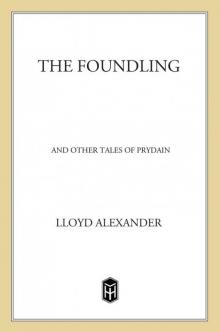 The Foundling and Other Tales of Prydain
The Foundling and Other Tales of Prydain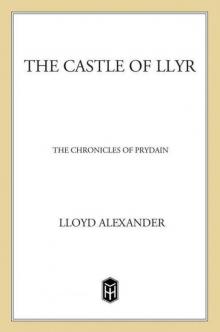 The Castle of Llyr
The Castle of Llyr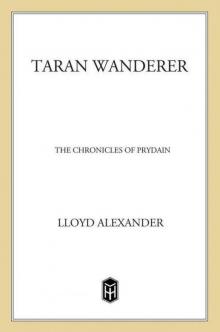 Taran Wanderer (The Chronicles of Prydain)
Taran Wanderer (The Chronicles of Prydain)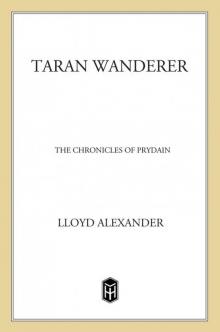 Taran Wanderer
Taran Wanderer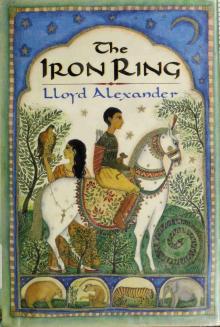 The Iron Ring
The Iron Ring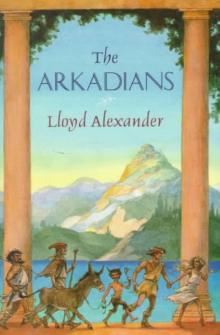 The Arkadians
The Arkadians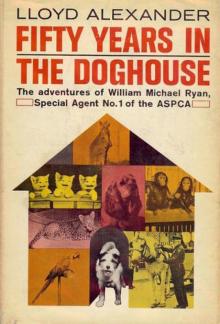 Fifty Years in the Doghouse
Fifty Years in the Doghouse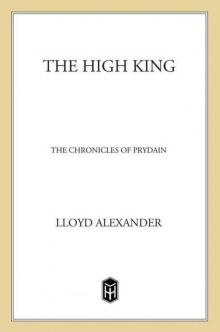 The High King
The High King The Remarkable Journey of Prince Jen
The Remarkable Journey of Prince Jen The Book of Three
The Book of Three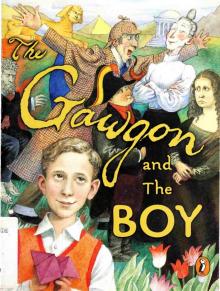 The Gawgon and the Boy
The Gawgon and the Boy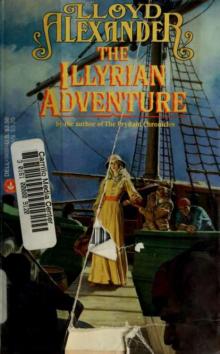 The Illyrian Adventure
The Illyrian Adventure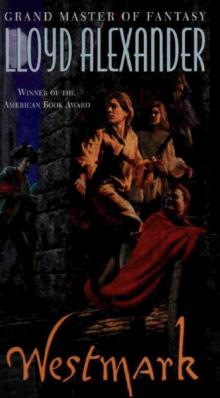 Westmark
Westmark The Black Cauldron
The Black Cauldron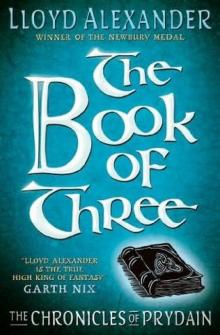 The Book of Three cop-1
The Book of Three cop-1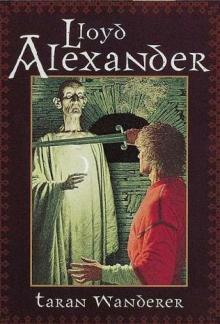 Taran Wanderer cop-4
Taran Wanderer cop-4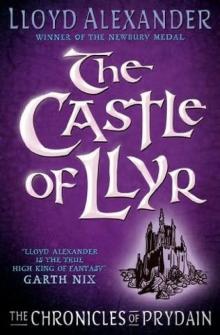 The Castle of Llyr cop-3
The Castle of Llyr cop-3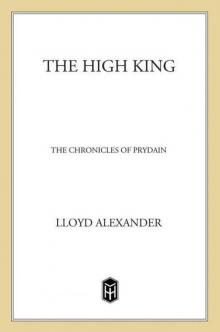 The High King (Chronicles of Prydain (Henry Holt and Company))
The High King (Chronicles of Prydain (Henry Holt and Company))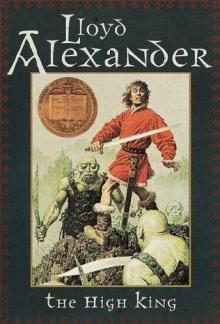 The High King cop-5
The High King cop-5 The Foundling
The Foundling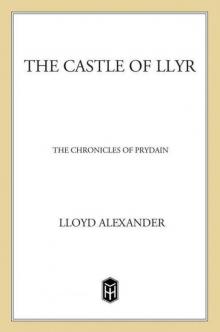 The Castle of Llyr (The Chronicles of Prydain)
The Castle of Llyr (The Chronicles of Prydain)